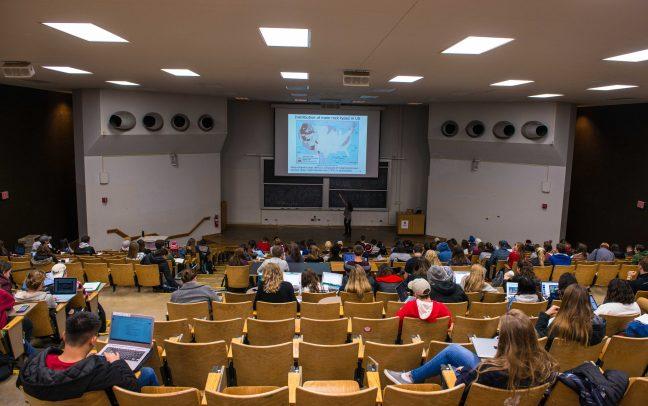Why did you go to college? Do you love to learn for learning’s sake? Are you here to start a career? Do you even know the answer to that question? I confess I’m not sure myself. I suppose I came to the University of Wisconsin because I had it drilled into my head by my parents that I would be missing out if I didn’t.
They were right. No matter the reason one goes to college, people who pursue any form of higher education do better for themselves than those who don’t. Compared to those who only earned high school diplomas, typical associate degree and technical diploma holders earn $133 more per week – that’s $6,900 more per year – and typical bachelor’s degree holders earn $30,000 more per year. This is a huge incentive to go to college. However, many people are held back not by their ambition or ability but by their situation.
Take for example Albert Einstein. He made great advancements in science that have benefited all of us. Yet he dropped out of school at age 15 because he hated the rote learning favored at the time and preferred to solve problems creatively. Our current public education system is unforgiving in that instead of organizing around learning and helping individuals be the best they can be, it is organized around studying for standardized tests. Einstein persevered, but many American high school students have their learning stunted by standardization. They do not go on to reach their full potential as bad high school grades often equate to less chances of getting into any institution of higher learning.
How many Einsteins are we missing out on today because our institutions of higher education are inaccessible to those who weren’t given a chance in high school?
Too many.
Too many kids are overlooked today because they did not have enough resources to do well in high school, or their high school offered a poorer quality of education than most. This is unfair — and yes, while life is unfair, we don’t have to accept that. We should at least attempt to make it fair.
Some issues the government can’t legislate away, like people being poor test takers even when they know the material or children not getting the support they need at home.
But there are issues the government can at least attempt to legislate away. Funding is a large contributor to the differences in quality of education. Public high schools tend to get just under half of their funding from local taxes – meaning that if you live in a low-income neighborhood, you’re getting an education that is lacking in the resources needed to succeed. Additionally, under the No Child Left Behind Act, a school’s test scores have great influence on the amount of federal funding the school gets and where that funding goes to. When low-performing schools do not receive the money they need to invest in their students, the quality of education stays poor and continues to deteriorate.
American high school students receive unequal qualities of education, limiting low income students’ options after graduation. Efforts are being made in Milwaukee to even the tables a little bit by increasing the accessibility of education to low-income students who did not get an equal opportunity to succeed as did their wealthier peers.
The program focuses on informing high school students of the Free Application for Federal Student Aid and the Milwaukee Area Technical College Promise. The MATC Promise offers free tuition at MATC for up to 75 credits – enough for an associate’s degree or technical diploma – in addition to any aid given by the federal government. The Promise is designed to help disadvantaged low-income students and students who were not academically inclined during high school, requiring that applicants be eligible for a Pell grant, have a minimum GPA of 2.0 or above, an ACT score of at least 16 and have graduated from a school in the MATC district or live in the MATC district. This makes it possible for those held back in high school to prove themselves by getting an associate’s degree and going on to get a bachelor’s, or by getting a technical diploma. The MATC Promise also offers guaranteed acceptance into dozens of partner colleges for eligible students.
Too often people are held back academically by their situation. This could be due to anything – from a poor home environment to our standardized public education system. This should not be the case. When everyone doesn’t get the opportunity to reach their full potential, society at large misses out on great people, like the next Einstein.
America can only be made better by increasing the accessibility of higher education to those who did not do well in high school, and those who cannot afford it. Programs like the MATC Promise should be expanded nationwide so that America can look forward to a better tomorrow.
Harry Quick (hfquick@wisc.edu) is a freshman studying economics.


